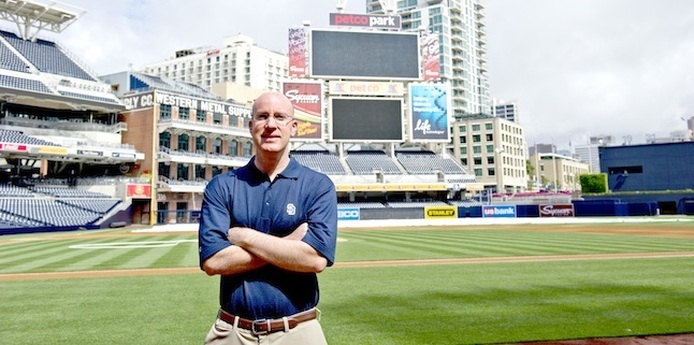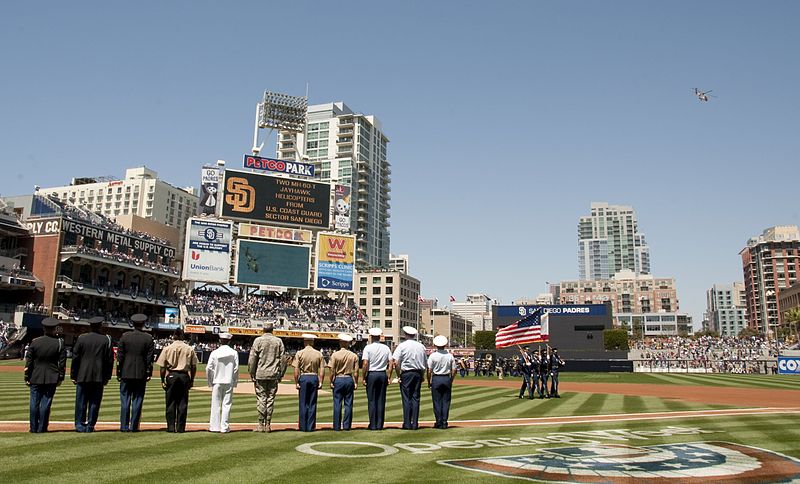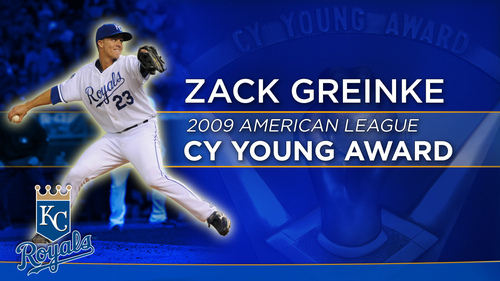|
Dave Holtzman is in his first year as Director of Communications for Major League Baseball's San Diego Padres. Coming over from a nine-year run with the Kansas City Royals, Dave is a sports PR professional who knows the ins and outs of PR at baseball's highest level. Here's what Dave had to say when I caught up with him to talk shop. Working in the Bigs Is your job as Director of Communications more proactive or reactive? It's certainly a blend, but in a perfect world you'd be more proactive than reactive. My job has changed since I've come over from Kansas City and I'm more half-and-half between business PR and baseball PR. A lot of business PR, almost all of it, is proactive. It's easy to cover baseball PR because we have a schedule and they know we're going to play, but in business PR we have to be proactive, target the right people and let them know ahead of time what's happening so they can preview whatever is happening and then react afterwards. What kind of proactive programs are the Padres running this season? There's a lot that we're doing right now, especially in the community. Today we're talking about our First Responder's Salute, which is something we've created this year. It recognizes people on the front line, whether it's police, fire, EMS and so on. One day each month we invite them out to the ballpark and during certain segments we recognize them and give them the publicity they deserve. It's interesting that within a week after we introduced this project there was the situation in Boston. That brought first responders to the forefront in the nation, and we felt good that we already had this program in place to celebrate them. How can a communications department help a sports team help the community? The Padres have an active audience that follows the team during the season every day. Because we carry a big stick in San Diego with the media to get the word out there, as communicators we're able to kind of shift everyone's focus a bit onto the community. It's our duty as an organization and as individuals to give back to the community and the military community. Zack GreinkeWhat role did you have in Zack Greinke's successful 2009 AL Cy Young bid? As the 2009 season went along, we realized by early August he was going to be a candidate. The idea for us isn't necessarily to announce he's a candidate and leave it at that. For his benefit, and for the Royals' benefit in terms of the publicity, we wanted to have him win the award we felt he deserved. We identified through our sources with the Baseball Writers Association who in each city would be voting for the award, as there are two writers in every AL city who vote for the Cy Young. We created a one-sheet, glossy flier/photo of Zack with all the stats on how he compares to other pitchers in the American League, and two or three quotes we had pulled from articles after games he had started from opposing managers or baseball experts, really showing how great a year he had. We mailed it off to the voters early so they got it with plenty of time before they voted. I think he would have won otherwise, but I think we had a role in the margin. At the time was that something that had been done before? I'd seen it a little bit emailed around, but that's something to very easily look at and delete. It shows a little extra effort for us to mail it out, and I think that could make a difference when they can open and keep it. What's the key lesson from the Greinke campaign? Media are busy and often they don't have time to do research, so if you put something in front of them that's easy to look at that goes a long way. The InternetHow do you identify credibility in an age where anyone with internet access can become a "sportswriter"? It's hard to filter everything. We keep an eye on some of the larger blogs in San Diego and we're familiar with what they're writing about. Most of what we filter through in the mornings before our intern sends out clips is the major publications, locally and nationally, especially the people who are able to get credentialed here and have access. What is your view of a sports team's Twitter profile? What every team should get to and what we're striving to get to is that it needs to be give and take. I think a lot of teams struggle, and we have here in the past, with more of give. We're broadcasting out a message, i.e. "game tonight at this time," "career-high four hits," "come out and buy tickets." What eventually needs to happen with us and other sports teams--some of them are doing it better than others--it needs to be two-way communication. That's what Twitter and Facebook and all social media is allowing us to do. Because fans feel like they have a voice, we need to respond to them and prove that their voice is being heard. How have you let fans know their voices are heard? Earlier this year we announced our promotion schedule. I wasn't here at the time, but it wasn't as well received as some in previous years and there was some negative reaction from fans on social media and bloggers. Our great ownership noticed and here’s what we did to thank our great fans:
Would you agree that Twitter has tremendous potential as a research tool? Research, messaging, branding...everything. The great thing about Twitter is that the only resource on our end that it requires is time. It's a free service in terms of advertising your product and reaching people you wouldn't reach otherwise. It's limitless what you can do on it. Getting the JobWhen you're thinking about hiring someone for your PR department, what kind of background are you looking for? For me, the best case scenario is someone who has already been in baseball business. In that way, they can hit the ground running. Baseball is a little bit different in the day-in, day-out duties grind than other sports. So:
How is MLB different from minor league ball? The attention we get is different from that of a minor league team. We're so specialized in duties in our communications department, where as someone who is in PR in the minor leagues is also going to do a lot of sales, they're going to do some marketing, and they might be involved in broadcasting--so there's a lot to it in the minor leagues. In the majors, the sheer volume of duties day-in, day-out in our communications department keeps us busy from early in the morning until postgame, with not a lot of breaks in between. For someone looking for a career in MLB, is it better to start off in MLB at a lower position or in the minor leagues in a "do-everything" role? That depends on what the person wants to focus on. If they want to be in PR then it's better to start at the MLB level as an intern or volunteer, or even before that as someone who is just in touch with someone who is a full-time PR staffer. That way, they can come out, shadow during the year, and come familiar with how things work. Nine times out of ten, people who receive full-time jobs in baseball PR were interns before that in baseball PR. How do you break through the barrier of going from an intern to a full-time coordinator? It's difficult, if I had that answer I would have entered the business before I did. In my case, going to Kansas to earn my Master's degree led to me meeting people that directly led me to my internship. In sports, a lot of people know a lot of people. In baseball, we see a different PR staff every three days, when you go on a road trip you see other people. You get to know them through that, you get to know them through our winter meetings. It's just a community that talks to each other, and when there are good people that we have working for us and there are other opportunities, we encourage our people, the good ones, to move on up. That's the goal. Can you break in to the inner circle? It is tough to get in, but our minds are open. The person who filled my role in Kansas City wasn't in professional baseball, he was working at a university, and he got in. The reason he got in was because we had become familiar with him over the last several years because he volunteered, he helped us with the All-Star Game last year, and it was just one of those things where you become familiar with somebody enough that he becomes the logical candidate to fill a full-time job.Familiarity is huge. When you're hiring someone and you know what you're going to get - you're not going to be surprised - that's a good feeling. The opposite is a little scary. Contacting Dave
0 Comments
Leave a Reply. |
Archives
April 2017
Categories
All
|



 RSS Feed
RSS Feed
